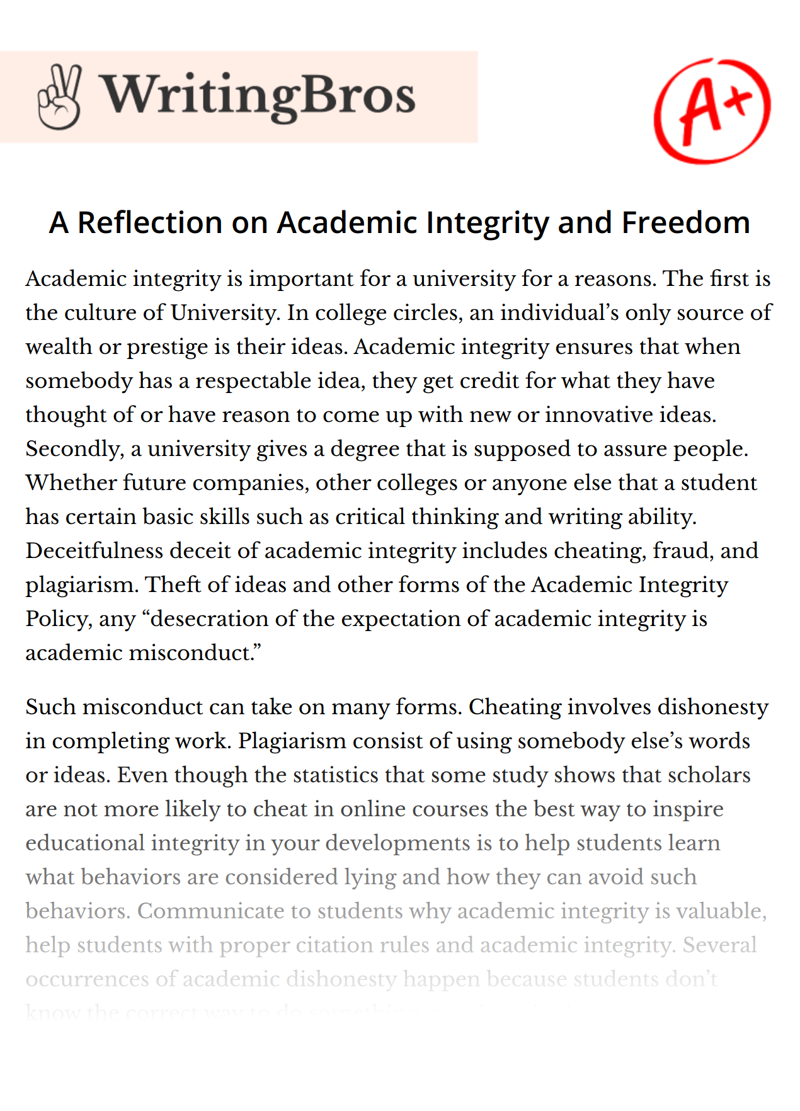A Reflection on Academic Integrity and Freedom

Academic integrity is important for a university for a reasons. The first is the culture of University. In college circles, an individual’s only source of wealth or prestige is their ideas. Academic integrity ensures that when somebody has a respectable idea, they get credit for what they have thought of or have reason to come up with new or innovative ideas. Secondly, a university gives a degree that is supposed to assure people. Whether future companies, other colleges or anyone else that a student has certain basic skills such as critical thinking and writing ability. Deceitfulness deceit of academic integrity includes cheating, fraud, and plagiarism. Theft of ideas and other forms of the Academic Integrity Policy, any “desecration of the expectation of academic integrity is academic misconduct.”
Such misconduct can take on many forms. Cheating involves dishonesty in completing work. Plagiarism consist of using somebody else’s words or ideas. Even though the statistics that some study shows that scholars are not more likely to cheat in online courses the best way to inspire educational integrity in your developments is to help students learn what behaviors are considered lying and how they can avoid such behaviors. Communicate to students why academic integrity is valuable, help students with proper citation rules and academic integrity. Several occurrences of academic dishonesty happen because students don’t know the correct way to do something, case in point how to cite sources or how to work with material from a website. In other circumstances, students simply make a poor decision. Look for some ideas on how to avoid academic dishonesty. Reading the syllabus carefully and seeking an explanation. While expectations about an assignment are unclear, do not rely on other students for information. At all times assume that you are expected to complete tasks on your own unless your teachers specify otherwise. Make clear what is expected of you when you are working on a group project. Don’t delay until the night before to begin an assignment. Being rushed for time is not an excuse for cheating or plagiarism.
Respectable time management also allows you to contact your instructor in case you have questions. Don’t share your assignments with others. If colleagues have a question, try to help them out but copying your assignment won’t teach them anything and you might be accused of academic dishonesty and keep track of sources and learn how to cite properly. Unapproved collaboration on an assignment, homework, or other task if not otherwise allowed by course instructor. Sharing, sales, or buying information related to graded material. Using a university teacher feedback for another student as the basis for an essay response. Resubmitting a paper that has already been submitted for another course.
Falsifying Information
Accessing or using unauthorized materials (electronic or print) and/or websites. Academic integrity is the pursuit of scholarly activity in an open, honest and responsible manner. All students should act with personal integrity, respect other students' dignity, rights and property, and help create and maintain an environment in which all can succeed through the fruits of their efforts. Student’s academic integrity is certain for tutors/professors to evaluate whether or not a student has met the standards of academic excellence. In other words, teachers cannot assess a student’s progress in the specific area of study if he practices academic dishonesty. Unquestionably, this condition would inoffensively affect the academic performance of students. Eluding plagiarism bring about understanding the idea of the author, generating your own words to express the idea and accommodating other people’s idea through citation.
Cite this Essay
To export a reference to this article please select a referencing style below

